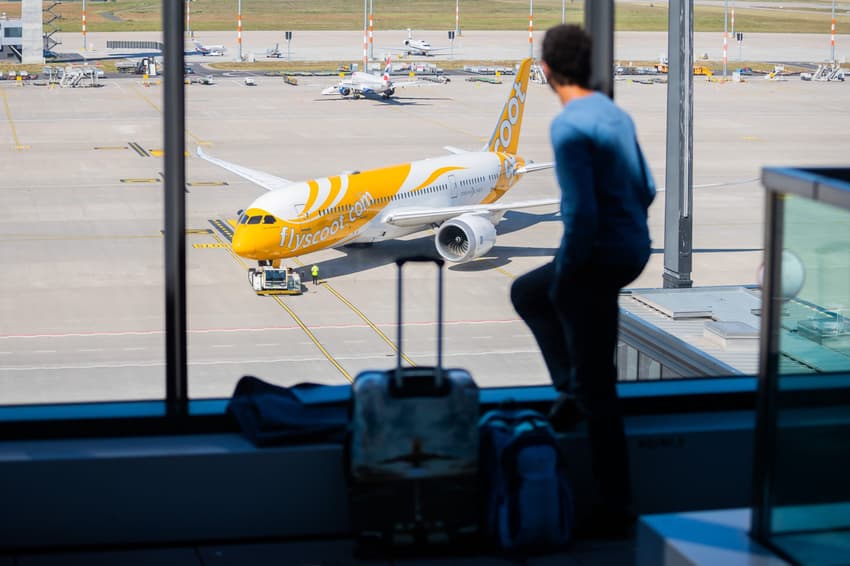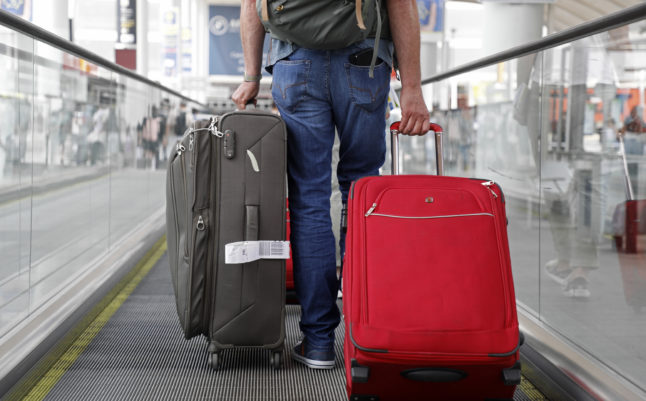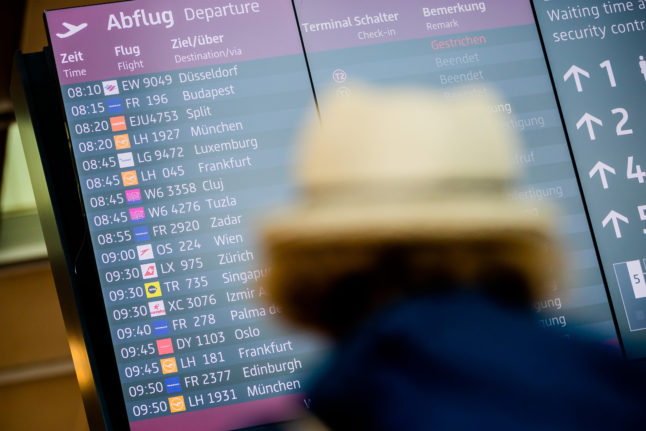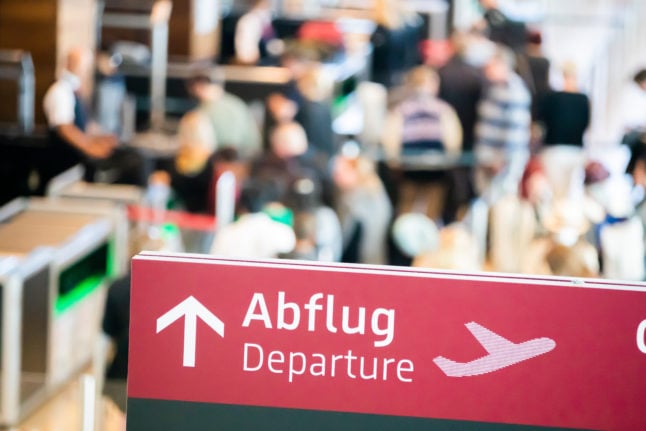Flight chaos: How your travel plans from Germany could change this summer

Staffing shortages, strikes and flight cancellations are threatening to interfere with the holiday mood in Germany this summer. Here's what we know so far.
What's going on?
The days are getting brighter and longer in Germany, and in late June, schools in North Rhine-Westphalia will be the first of the states to break up for the summer holidays. For most in Europe, this will be the first summer in which they can travel with few Covid restrictions since 2019 - and plenty of people are hoping to make the most of it.
But early signs suggest that airports and airlines are poorly prepared for the peak travel months.
In a major blow to people hoping to fly this summer, Germany's largest airline group, Lufthansa, announced on Thursday that it would be scrubbing more than 1,000 flights from its schedule. The vast majority of these will be Lufthansa flights, while the rest will be flights run by its subsidiaries Eurowings and Swiss.
Announcing the cancellations, the company said it was "good news" that the travel sector was bouncing back after Covid, but added that infrastructure at airports, air traffic control and in airlines had still not been fully restored.
"Lufthansa and Eurowings have implemented numerous measures to ensure the greatest possible stability of the flight schedule and thus offer their customers the best possible planning security," Lufthansa said. "However, it is foreseeable that the flight schedules cannot be flown as hoped due to the bottlenecks."
The news follows reports of travel chaos in European airports over the Whitsun weekend, with travellers waiting hours at airports, facing delayed and cancelled flights and thousands of people getting stranded abroad.
With just weeks to go until the start of the school holidays in Germany, flight passengers should potentially brace themselves for crowed airports and delays on their travels.
READ ASLO: Germany’s largest airline cancels hundreds of summer flights
Which flights will be affected?
Lufthansa has removed 900 planned domestic and European flights from its July schedule. These will all be taken off the weekend flight plan - meaning flights that usually run on Fridays, Saturdays and Sundays - and will only affect flights leaving from, or arriving at, Munich and Frankfurt airports.
The Swiss flight cancellations will affect routes running between Zurich and Germany. Eurowings has also cancelled hundreds of flights throughout the month of July, though it is still unclear which services will be impacted.
Eurowings operates flights between Germany and other European countries including France, Denmark, Spain, Ireland and the UK, as well as flights to further away destinations like Armenia, Turkey and Morocco.
Pressed for more details on the exact changes to the flight schedule, a spokesman for Lufthansa refused to comment further.
"We will not publish a list of cancellations, but will contact the affected guests directly," he told The Local. "That will be more useful."
Do other airlines have similar issues?
Since the pandemic, British airline Easyjet has also faced major staffing problems and has even had to take some seats out of its aircraft in order to fly planes with fewer flight attendants.
On Friday morning, the Märkische Allgemeine reported that the airline was cancelling 12 flights a day to and from Berlin Brandenburg airport due to its staff shortages. Until the end of August, just 100 Easyjet flights per day will be running to and from Berlin.
"We plan to operate our regular summer schedule with an average of around 1,700 flights per day across the Easjet network," a spokesperson told The Local.
"Unfortunately, due to the ongoing difficult operating environment, a small number of flights had to be cancelled in advance during the peak travel period from June 1st to August 31st. We will continue to monitor the situation closely and take action in advance where possible.
"We very much regret the short notice of some of these flight cancellations and the inconvenience this will cause to customers booked on these flights."

A man arrives at Palma Mallorca Airport - a popular destination for German tourists. Photo: picture alliance/dpa | Clara Margais
This doesn't appear to be the only headache facing Easyjet, as the company has had to contend with warning strikes at BER ahead of wage negotiations. On Friday morning, the union Verdi called on Easyjet staff to stage a mass walkout, which impacted numerous services at the airport between 5am and 10am.
The union is calling for a wage increase of at least five percent per year - and if doesn't get its way, further strikes could be on the horizon.
READ ALSO: Germany may face airport chaos in summer, warns minister
At present, it's unclear whether other budget airlines such as Ryanair will join EasyJet and Lufthansa in cancelling flights, but the Irish airline is currently mulling an increase in prices.
"We anticipate an increase of five to ten percent (in ticket prices)," Andreas Gruber, head of the German branch of Ryanair, told BR24. He also said that the company would be focussing on running services from regional airports amid disagreements over the fees at larger airports such as BER.
The Local contacted Ryanair to find out about further reductions in services over summer, but at the time of writing, had not yet received a response.
What about the airports?
Along with flight cancellations, passengers should prepare for potentially long wait times at airports over summer - and particularly the biggest ones.
Frankfurt airport (Fraport), for instance, scrapped 4,000 jobs during the pandemic and lost additional staff as people left to find more attractive positions elsewhere. The company says it wants to fill 1,000 positions this year, but admits that finding a 100 new staff members a month is no mean feat.
"Together with our partners, we have taken various measures to stabilise operations due to the well-known challenges affecting the entire industry," a spokesperson for Fraport told The Local.
"This also includes the pre-tactical cancellation of flights by individual airlines. We thank our process partners for this. Because this step also contributes to stabilising the operational processes in the traffic peaks, especially in the summer travel season."

A woman checks the flight departures board at BER airport over the Whitsun weekend. Photo: picture alliance/dpa | Christoph Soeder
Meanwhile, the head of Düsseldorf Airport has announced emergency measures for the start of school holidays in North Rhine-Westphalia at the end of June. Special airport teams will be on hand to help airline staff with the loading of luggage and student assistants will be called in to help speed up security and direct passengers to less congested areas.
The problems with Berlin's cash-strapped airport are well-known, and it's unlikely that passengers flying from BER will be exempted from the chaos.
“Across all locations, the service providers involved in handling passengers are short of around 20 percent ground staff compared to pre-corona times,” the CEO of the German Airport Association, Ralph Beisel, told DPA recently.
“This can lead to bottlenecks at peak times, especially in check-in, baggage loading and aviation security control.”
READ ALSO: REVEALED: The best night trains running through Germany
Why is this happening?
During the pandemic, companies in the travel and tourism sector cut staff to a bare minimum and nobody appears to have anticipated the so-called "catch up" effect once the rules were relaxed. People are not just travelling like they did in 2019 - they're making up for lost time.
In the case of the the Lufthansa Group, more than 30,000 staff were fired over the course of the pandemic. But now the airline is seeing record passenger numbers.
Lufthansa CEO Carsten Spohr said in May that the airline was projecting a record summer for tourist activity, with the latest data showing passenger numbers bouncing back from the coronavirus pandemic.
The number of passengers on Lufthansa flights "more than quadrupled" to 13 million in the first quarter or 2022, compared to just three million passengers in the first quarter of 2021.
Now, airlines and airports are scrambling to correct their mistake, but hiring and training thousands of people doesn't happen overnight.

People queue at departures at BER airport on Friday, June 3rd. Photo: picture alliance/dpa | Christoph Soeder
What can passengers do?
Firstly, there's no reason to panic about cancelled flights before they happen. If the airline does cancel a service for any reason, passengers will be informed in advance and given the opportunity to either rebook on a new flight or receive a refund.
If necessary, your airline should cover meals and hotel rooms while you're waiting for the next flight.
In the case of Lufthansa and Eurowings, passengers can also exchange their domestic flight for a second-class train ticket to the airport they were intending to fly to. So, for instance, if you were flying from Berlin to Munich, you can easily hop on a high-speed train instead.
In any case, it's important to know your rights as a passenger. The European Union has strict rules on compensation for cancelled and delayed flights, so you could be entitled to up to €600 if something goes wrong.
READ ALSO: Airport chaos in Europe: What are your rights if flights are delayed or cancelled?
There are also some tips and tricks you can try to ensure that everything runs smoothly. Travelling on weekdays and at less popular times of day is one obvious way to avoid the crowds, even at the height of summer.
Focus Online's Konstantinos Mitsis, who specialises in money-saving tips, also suggests using the €9 transport ticket to travel to a smaller airport in the region. For example, travellers from Munich could consider going to Memmingen Airport instead.
Flights may be cheaper from smaller destinations, and these regional airports could be less busy than the transport hubs attached to major cities.
Other than that, passengers can follow a few small rules of thumb to make sure things go smoothly: check in for the flight the night before online, get to the airport with plenty of time to spare and bring minimal hand-luggage to ensure you and others can get through security quickly.
Comments
See Also
What's going on?
The days are getting brighter and longer in Germany, and in late June, schools in North Rhine-Westphalia will be the first of the states to break up for the summer holidays. For most in Europe, this will be the first summer in which they can travel with few Covid restrictions since 2019 - and plenty of people are hoping to make the most of it.
But early signs suggest that airports and airlines are poorly prepared for the peak travel months.
In a major blow to people hoping to fly this summer, Germany's largest airline group, Lufthansa, announced on Thursday that it would be scrubbing more than 1,000 flights from its schedule. The vast majority of these will be Lufthansa flights, while the rest will be flights run by its subsidiaries Eurowings and Swiss.
Announcing the cancellations, the company said it was "good news" that the travel sector was bouncing back after Covid, but added that infrastructure at airports, air traffic control and in airlines had still not been fully restored.
"Lufthansa and Eurowings have implemented numerous measures to ensure the greatest possible stability of the flight schedule and thus offer their customers the best possible planning security," Lufthansa said. "However, it is foreseeable that the flight schedules cannot be flown as hoped due to the bottlenecks."
The news follows reports of travel chaos in European airports over the Whitsun weekend, with travellers waiting hours at airports, facing delayed and cancelled flights and thousands of people getting stranded abroad.
With just weeks to go until the start of the school holidays in Germany, flight passengers should potentially brace themselves for crowed airports and delays on their travels.
READ ASLO: Germany’s largest airline cancels hundreds of summer flights
Which flights will be affected?
Lufthansa has removed 900 planned domestic and European flights from its July schedule. These will all be taken off the weekend flight plan - meaning flights that usually run on Fridays, Saturdays and Sundays - and will only affect flights leaving from, or arriving at, Munich and Frankfurt airports.
The Swiss flight cancellations will affect routes running between Zurich and Germany. Eurowings has also cancelled hundreds of flights throughout the month of July, though it is still unclear which services will be impacted.
Eurowings operates flights between Germany and other European countries including France, Denmark, Spain, Ireland and the UK, as well as flights to further away destinations like Armenia, Turkey and Morocco.
Pressed for more details on the exact changes to the flight schedule, a spokesman for Lufthansa refused to comment further.
"We will not publish a list of cancellations, but will contact the affected guests directly," he told The Local. "That will be more useful."
Do other airlines have similar issues?
Since the pandemic, British airline Easyjet has also faced major staffing problems and has even had to take some seats out of its aircraft in order to fly planes with fewer flight attendants.
On Friday morning, the Märkische Allgemeine reported that the airline was cancelling 12 flights a day to and from Berlin Brandenburg airport due to its staff shortages. Until the end of August, just 100 Easyjet flights per day will be running to and from Berlin.
"We plan to operate our regular summer schedule with an average of around 1,700 flights per day across the Easjet network," a spokesperson told The Local.
"Unfortunately, due to the ongoing difficult operating environment, a small number of flights had to be cancelled in advance during the peak travel period from June 1st to August 31st. We will continue to monitor the situation closely and take action in advance where possible.
"We very much regret the short notice of some of these flight cancellations and the inconvenience this will cause to customers booked on these flights."

This doesn't appear to be the only headache facing Easyjet, as the company has had to contend with warning strikes at BER ahead of wage negotiations. On Friday morning, the union Verdi called on Easyjet staff to stage a mass walkout, which impacted numerous services at the airport between 5am and 10am.
The union is calling for a wage increase of at least five percent per year - and if doesn't get its way, further strikes could be on the horizon.
READ ALSO: Germany may face airport chaos in summer, warns minister
At present, it's unclear whether other budget airlines such as Ryanair will join EasyJet and Lufthansa in cancelling flights, but the Irish airline is currently mulling an increase in prices.
"We anticipate an increase of five to ten percent (in ticket prices)," Andreas Gruber, head of the German branch of Ryanair, told BR24. He also said that the company would be focussing on running services from regional airports amid disagreements over the fees at larger airports such as BER.
The Local contacted Ryanair to find out about further reductions in services over summer, but at the time of writing, had not yet received a response.
What about the airports?
Along with flight cancellations, passengers should prepare for potentially long wait times at airports over summer - and particularly the biggest ones.
Frankfurt airport (Fraport), for instance, scrapped 4,000 jobs during the pandemic and lost additional staff as people left to find more attractive positions elsewhere. The company says it wants to fill 1,000 positions this year, but admits that finding a 100 new staff members a month is no mean feat.
"Together with our partners, we have taken various measures to stabilise operations due to the well-known challenges affecting the entire industry," a spokesperson for Fraport told The Local.
"This also includes the pre-tactical cancellation of flights by individual airlines. We thank our process partners for this. Because this step also contributes to stabilising the operational processes in the traffic peaks, especially in the summer travel season."

Meanwhile, the head of Düsseldorf Airport has announced emergency measures for the start of school holidays in North Rhine-Westphalia at the end of June. Special airport teams will be on hand to help airline staff with the loading of luggage and student assistants will be called in to help speed up security and direct passengers to less congested areas.
The problems with Berlin's cash-strapped airport are well-known, and it's unlikely that passengers flying from BER will be exempted from the chaos.
“Across all locations, the service providers involved in handling passengers are short of around 20 percent ground staff compared to pre-corona times,” the CEO of the German Airport Association, Ralph Beisel, told DPA recently.
“This can lead to bottlenecks at peak times, especially in check-in, baggage loading and aviation security control.”
READ ALSO: REVEALED: The best night trains running through Germany
Why is this happening?
During the pandemic, companies in the travel and tourism sector cut staff to a bare minimum and nobody appears to have anticipated the so-called "catch up" effect once the rules were relaxed. People are not just travelling like they did in 2019 - they're making up for lost time.
In the case of the the Lufthansa Group, more than 30,000 staff were fired over the course of the pandemic. But now the airline is seeing record passenger numbers.
Lufthansa CEO Carsten Spohr said in May that the airline was projecting a record summer for tourist activity, with the latest data showing passenger numbers bouncing back from the coronavirus pandemic.
The number of passengers on Lufthansa flights "more than quadrupled" to 13 million in the first quarter or 2022, compared to just three million passengers in the first quarter of 2021.
Now, airlines and airports are scrambling to correct their mistake, but hiring and training thousands of people doesn't happen overnight.

What can passengers do?
Firstly, there's no reason to panic about cancelled flights before they happen. If the airline does cancel a service for any reason, passengers will be informed in advance and given the opportunity to either rebook on a new flight or receive a refund.
If necessary, your airline should cover meals and hotel rooms while you're waiting for the next flight.
In the case of Lufthansa and Eurowings, passengers can also exchange their domestic flight for a second-class train ticket to the airport they were intending to fly to. So, for instance, if you were flying from Berlin to Munich, you can easily hop on a high-speed train instead.
In any case, it's important to know your rights as a passenger. The European Union has strict rules on compensation for cancelled and delayed flights, so you could be entitled to up to €600 if something goes wrong.
READ ALSO: Airport chaos in Europe: What are your rights if flights are delayed or cancelled?
There are also some tips and tricks you can try to ensure that everything runs smoothly. Travelling on weekdays and at less popular times of day is one obvious way to avoid the crowds, even at the height of summer.
Focus Online's Konstantinos Mitsis, who specialises in money-saving tips, also suggests using the €9 transport ticket to travel to a smaller airport in the region. For example, travellers from Munich could consider going to Memmingen Airport instead.
Flights may be cheaper from smaller destinations, and these regional airports could be less busy than the transport hubs attached to major cities.
Other than that, passengers can follow a few small rules of thumb to make sure things go smoothly: check in for the flight the night before online, get to the airport with plenty of time to spare and bring minimal hand-luggage to ensure you and others can get through security quickly.
Join the conversation in our comments section below. Share your own views and experience and if you have a question or suggestion for our journalists then email us at [email protected].
Please keep comments civil, constructive and on topic – and make sure to read our terms of use before getting involved.
Please log in here to leave a comment.